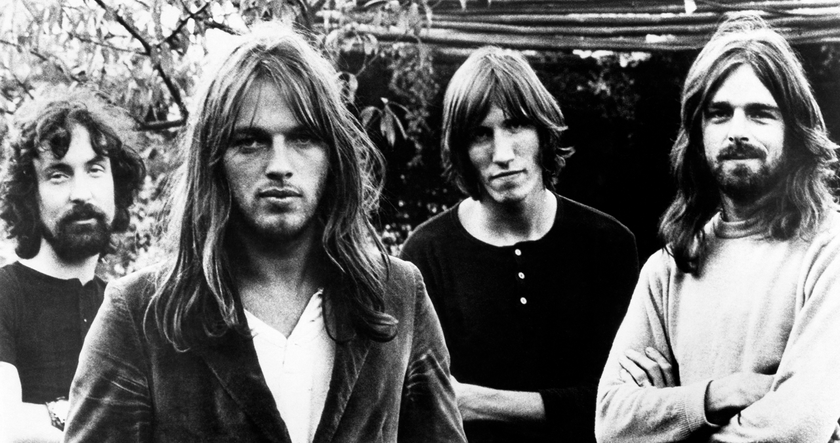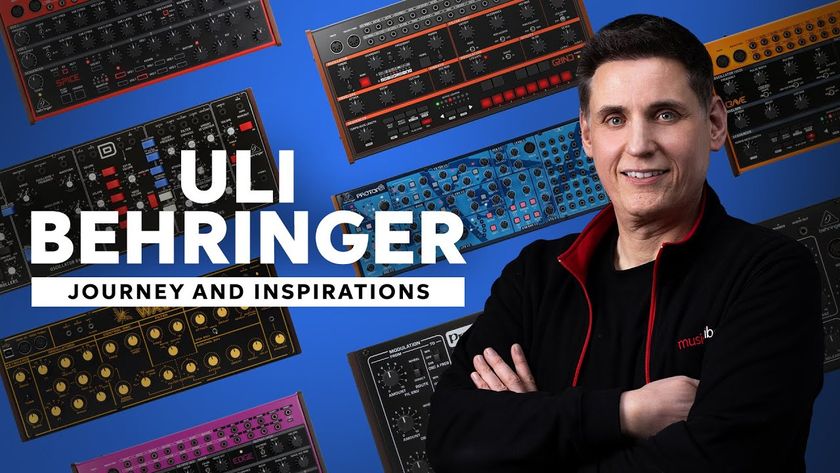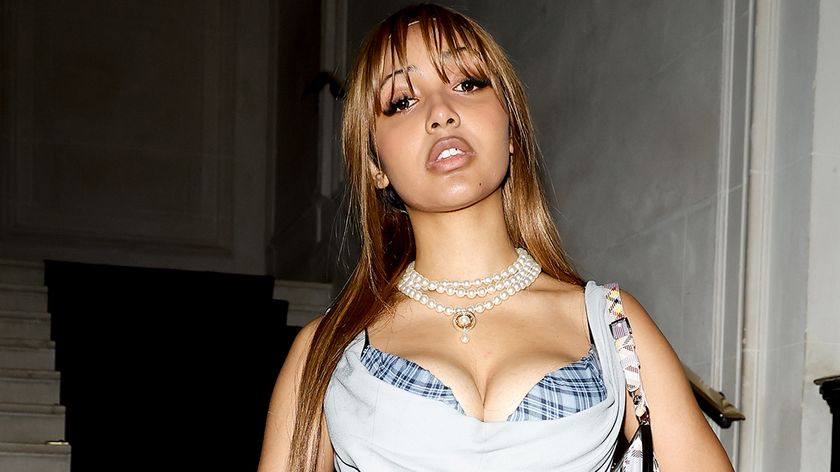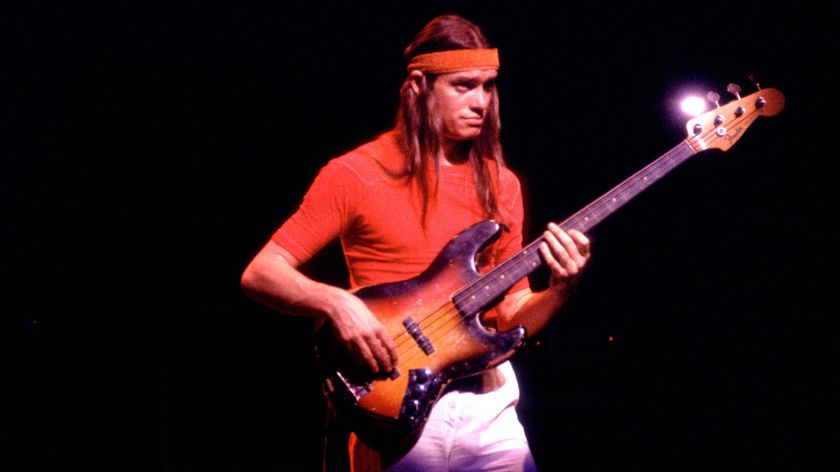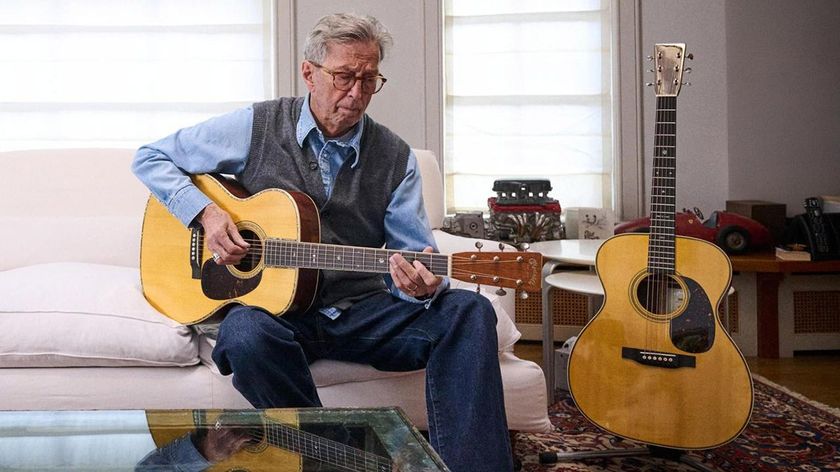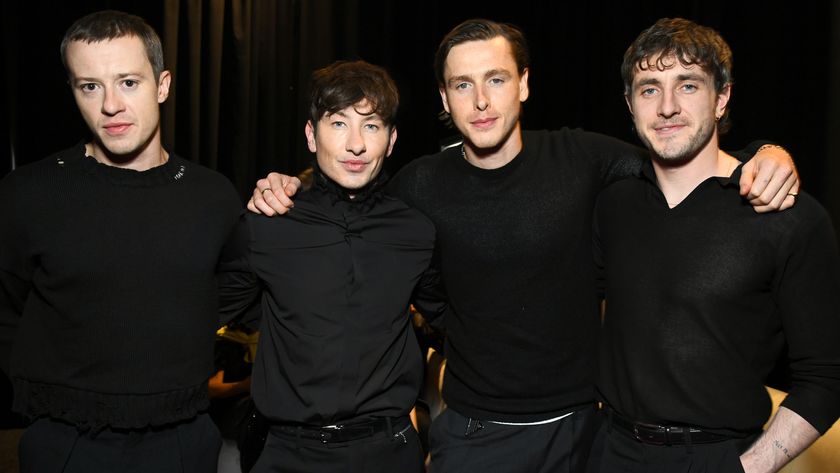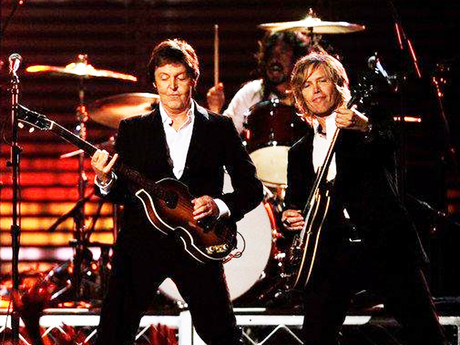
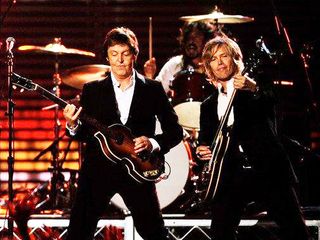
Brian Ray on stage with Paul McCartney at the 2009 Grammy Awards. (Check out Dave Grohl on drums!) Photo courtesy of Brian Ray.
"Playing bass for Paul McCartney, it's almost unthinkable," says Brian Ray. "He practically invented rock bass. I might be in his band, but I still consider myself a fan, a follower, a devotee."
Even so, the Glendale, California native, who has switched between bass and guitar in Macca's touring outfit since 2002, chalks up his enviable gig to "never having said no, and always being ready. You never know when opportunity will knock."
Ray, a journeyman musician, who has played with everyone from Bobby 'Boris' Pickett (he did The Monster Mash) to Rita Coolidge to Peter Frampton to Smokey Robinson, and who served as Etta James' musical director for 14 years, fully admits that Sir Paul "could play his full show on bass himself if he wanted to. But I think he really likes playing the guitar, and he's great at it. Luckily, I'm pretty good at both instruments, so that made me his go-to guy."
So how did Ray land the sweetest of sweetheart gigs, becoming the 'go-to' guy for one of the Fab Four? And what kind of advice does he have for other musicians looking to nab their big break?
MusicRadar asked him just that.
So let's get right to it: How in the world does somebody get to play with one of The Beatles?
Get the MusicRadar Newsletter
Want all the hottest music and gear news, reviews, deals, features and more, direct to your inbox? Sign up here.
[laughs] "That's the big question, isn't it? In short, my answer would be to never say no to anything. No gig is ever too small. When I was coming up, if there was a show happening at a community center, I was there. If there was a gig happening at a street fair, I was there. You never know when that chance might come along and somebody who can do something for you might see you. So even if you're being paid 10 bucks, come on, you might as well play. Nobody's going to discover you if you're just sitting in your bedroom."
But we do have the Internet these days - so people actually can discover you if you're sitting in your bedroom.
[laughs] "True, true. But at the end of the day, if you want to be a real musician and a player in a band, you've got to jam with people and learn how to interact with them. You have to know how to gel with a band and make yourself valuable. Gigging is the only way to do that."
Explain to me what it's actually like to play with Paul. Like millions of people, you first saw The Beatles on The Ed Sullivan Show - and now you're on stage with one of those four men who changed the world.
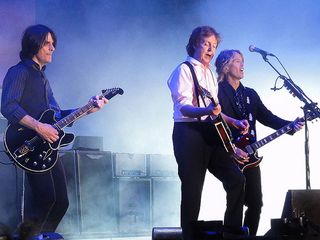
With Macca at the Hollywood Bowl, March 2010. Guitarist Rusty Anderson pictured left. Photo by Derrick Guzelf, courtesy of Brian Ray.
"There are no words, really. It's the gig of a lifetime. And the funny thing is, I knew this would be the job for me at an early age. I was lucky enough to have a half-sister who was 15 years my elder. She would baby-sit for me, as I was just a toddler at the time, and I remember seeing her and her friends 'oohing' and 'ahhhing' over records of all the pop stars of the early '60s.
"Then one night this group called The Beatles played on TV, and it was a pivotal moment for me. All at once I said, 'This is something I'm going to do for a living.' Here I was, watching four guys who were all young, having fun, enjoying themselves. It wasn't a made-for-TV band; The Beatles were the real deal. The whole thing was thrilling beyond words. After that night, I started playing the guitar."
What was your first guitar?
"It was my brother's Gibson acoustic. He didn't really have the passion, so I kind of took the guitar over and within two weeks I passed him up. I learned Gloria because it had only three chords, and eventually, I started to progress to Beatles songs."
Now, right after high school, you joined Bobby 'Boris' Pickett's band. How did that come about?
"I had been playing in a couple of bands, and one night we got a gig opening for him. The song Monster Mash kept coming back every now and then, and during '72 or '73 Bobby was having another resurgence. This led to me joining his group and playing The Monster Mash at all the Six Flags amusement parks in the country for about a year. It was a blast. I learned so much about performing from that experience. Of course, I had to dress up in this zombie makeup, which scared the shit out of kids. It was crazy!" [laughs]
You were KISS before KISS.
[laughs] "Exactly. We were KISS before KISS. We were out there scaring the crap out of kids and their parents, throwing chicken wings at them and telling them they were bat wings. Hey - it's showmanship, you know?
"But see, a lot of people might have turned down a gig like that because it wasn't, you know, 'musically credible' or something. But I said, 'Hey, it's a paying gig and I get to play in front of lots of people and be a part of a band.' I saw no shame in it.
"Best of all, and this just shows you how one gig can lead to another, as a member of Bobby 'Boris' Pickett and the Crypt Kicker Five, I was introduced to a fellow named Phil Kaufman, who was the road manager for Etta James. Phil took me to one of Etta's rehearsals and she leaned over to him and said, 'I like this little white boy.' Long story short: I started playing with her, and that led to a 14-year career as her band leader."
From The Monster Mash to Etta James - that's quite a leap.
"It was, but I had enough confidence in myself to know that I could do it. Right time, right place. It's like I said, you've got to put yourself out there. If I said no to playing with Bobby Pickett, I wouldn't have wound up with Etta James. That really prepared me for my gig with Paul McCartney, because I had to go from being this feel player to learning how to read charts and writing out music and learning a giant catalogue of songs in a very short time."
So how did you go from Etta James to Paul McCartney? Did you meet him somewhere? Was there an audition?
"Interesting story. I was in France playing with two different artists, and the drummer for both of them was Abe Laboriel Jr. Flash forward a couple of years and Abe had just finished working on Paul's record Driving Rain. This was in 2002. Abe was at my birthday party, and I asked him who was going to play the MVP role on the upcoming tour - you know, the guy who floats between guitar and bass. And he said that they were looking for somebody, a guitar player who could also play bass. I immediately put my hand in the air and said, 'I want a shot at that.'"
Now, it's one thing to say, "I'm the guy who can play guitar for Paul McCartney" - even though he's no slouch on the six-string - but it's quite another to say, "I can play bass for Paul McCartney." What the hell were you thinking?
"A part of me wasn't thinking at all! [laughs] I just knew that I couldn't let the opportunity pass me by. And I was prepared to work at it and woodshed and get the job. Up till then, my bass playing experience was rather limited, but I was going to prove that I could do it.
"I met Paul, rehearsed one song with him - this was to be for the Super Bowl where we played his song Freedom - and then I ran home and picked up the bass and worked my ass off. I never wanted something so bad in all my life."
Paul McCartney pretty much wrote the book on playing rock bass, particularly from 1966 onward. What made him see you as a true bassist and not just a guitar player who could fake it?
"Good question. After that first Super Bowl meeting, he said, 'Welcome aboard, Brian. Stick with Abe and [McCartney band lead guitarist] Rusty [Anderson] and they'll show you the ropes.' That didn't guarantee I had the gig. So I went home, grabbed my Guild M-80 bass, and I stood there for five weeks straight with every Beatles, Wings and Paul McCartney solo record in existence and learned them all. I did my homework, and I earned the spot."
When playing live with Paul, how does he decide which songs he's going to play bass on?
"It's mostly determined by what instrument he wrote the song on and recorded it with. Hey Jude, Lady Madonna, Let It Be, My Love - he wrote all of those on piano, so he's going to play piano and I'm going to play bass. If it's Sgt Pepper, The End, Let Me Roll It, I'm going to play bass on those, too. In the case of The End, though, I actually have to switch from bass to guitar because we trade solos in the end part.
"It's interesting: On Paperback Writer, which has that amazing bass part - he practically re-invented himself as a bassist with that song - he's more comfortable playing the guitar on that live, so he lets me take over on bass. Helter Skelter, however, he likes to play the bass on that, so I play the guitar. It changes around a little bit. I sort of have to be prepared to play bass and guitar on every song."
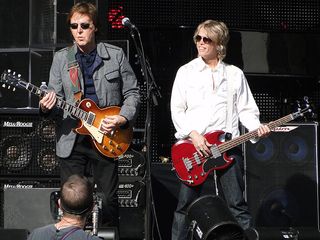
Soundcheck at the Hollywood Bowl, March 2010. Brian plays his Gibson SG bass. Photo by Derrick Guzelf, courtesy of Brian Ray.
Does he ever give you direction as to your bass playing?
"Not really. There's only been a couple of times where he's said, 'Hey Brian, I'm not totally sure that's how I played it. Listen to that intro one more time.' Most of the time he's been happy with what I do. He'll look at me and wink and smile - you can't beat that."
Still, are there some parts that you can't nail exactly as he played them on record?
"Yeah. On a lot of Beatles records there was so much invention going on that it's hard to tell what was happening. In those cases, you have to do your own thing and get it as close as you can.
"But if I can get something note-for-note, particularly on a song like Getting Better, where the bass part is so important, that's an amazing feeling. You can't bluff your way around that song; you have to get the whole thing down."
What kind of basses and amps do you use live?
"I use Gibson SG basses. For amps, I use the Ashdown 900 Series. No pedal effects on the bass - just straight in. That's pretty much it."
Have you ever picked up a Hofner Violin Beatle Bass during a show?
"No, Paul pretty much pointed out to me early on that the Hofner was his thing. [laughs] Why would I try to pick that bass up when he's so identified with it? It would be pretty silly, if not downright wrong."
What has Paul taught you musically?
"That's a great question. I guess the biggest thing is his philosophy. He always says, 'You don't work music, you play music.' His approach is very playful and almost childlike and naïve. To approach music with as little thought and process as possible, to be very casual about it, is so important. He always has a song in his heart, he's always whistling something and he's always inventing."
What was the most memorable show you've played with him?
"Wow, there's so many. Man, I have to think…"
How about when Paul received the Gershwin Prize and the band played the White House?
"That was a real cherry on top of the sundae, for sure. What an honor. [laughs] I remember Jerry Seinfeld was giving a speech and he said, 'So the Gershwin Prize going to Paul McCartney. I have one word: duh!' [laughs]
"As big a thrill as it was, that night was a little nerve-wracking, because it was the first time a full rock band played the White House. We had everything, the whole backline, all the gear - it was loud! [laughs] The President sat right in front of us. Pretty incredible."
Is there a Beatles song that you feel you play particularly well? Also, is there one you feel you haven't quite nailed yet?
"I think we play Helter Skelter very, very well. It's the first heavy metal song, in my opinion. We bring a lot of insane energy to that. It's dark, massive and a lot of fun. One song I don't think we play well…I will say we've tried Lovely Rita a few times, and Paul has never added it to the set. I just don't think he's comfortable with it for whatever reason. We didn't suck at it; I just don't think he feels it the way he wants to."
Paul is now 68 years old. Has he ever given any indication of wanting to retire?
"No. He said something really funny once, I think it was in 2007 [adopts British accent]: 'Uh, I don't think I was ever hired, so why should I retire?' [laughs] I think his attitude is, as long as he's having fun and can do it, he's going to do it. He's never said anything about stopping."
You have your own album, This Way Up, coming out. The first song, I Found You, is pretty rocking. Is it indicative of what we can expect on the rest of the record?
"Yeah, I think so. I wanted to offer people a nice escape from all of the downturns that are happening in the world. In that way, I put together a collection of songs that are fun and rocking, but there are a few introspective numbers, as well."
Obviously, you're pretty busy with Paul, but are you going to try to tour behind the album?
"I sure am. When and how will have to be figured out - everything fits around Paul's schedule. But I do want to get on the road and play these songs live. Absolutely."
You've got what many people would consider to be one of the world's greatest gigs. What kind of advice do you have for players who are hoping to score a spot like yours?
"My advice is pretty simple: Just say yes! As I said before, any opportunity I've had has led to something else, and it's because I never said no to anything. A lot of these opportunities were filling in for some guitar player who couldn't make a session or playing a blues jam at the Jolly Roger Inn for 60 bucks. Every gig matters if you treat it seriously. I don't care what it is - you get your ass down there, set up your stuff and play with a smile on your face. If you do that, good things will happen. I'm living proof."
Liked this? Now read: Paul McCartney's guitarist Rusty Anderson gives career advice
Connect with MusicRadar: via Twitter, Facebook and YouTube
Get MusicRadar straight to your inbox: Sign up for the free weekly newsletter
Joe is a freelance journalist who has, over the past few decades, interviewed hundreds of guitarists for Guitar World, Guitar Player, MusicRadar and Classic Rock. He is also a former editor of Guitar World, contributing writer for Guitar Aficionado and VP of A&R for Island Records. He’s an enthusiastic guitarist, but he’s nowhere near the likes of the people he interviews. Surprisingly, his skills are more suited to the drums. If you need a drummer for your Beatles tribute band, look him up.
![Chris Hayes [left] wears a purple checked shirt and plays his 1957 Stratocaster in the studio; Michael J. Fox tears it up onstage as Marty McFly in the 1985 blockbuster Back To The Future.](https://cdn.mos.cms.futurecdn.net/nWZUSbFAwA6EqQdruLmXXh-840-80.jpg)
“We’re looking at the movie going, ‘Urgh! It’s kinda cheesy. I don’t know if this is going to work”: How Chris Hayes wrote Huey Lewis and the News’ Back To The Future hit Power Of Love in his pyjamas
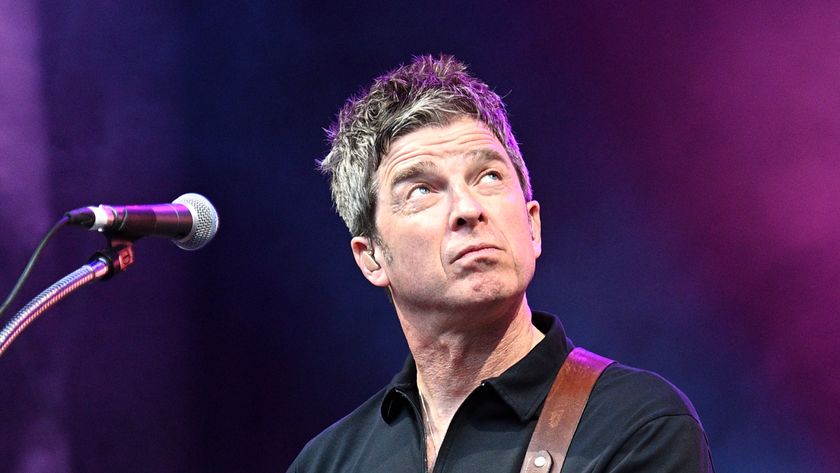
“I thought it’d be a big deal, but I was a bit taken aback by just how much of a big deal it was”: Noel Gallagher finally speaks about Oasis ticket chaos

